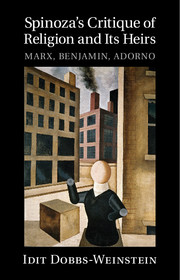Book contents
- Spinoza's Critique of Religion and Its HeirsMarx, Benjamin, Adorno
- Spinoza's Critique of Religion and Its Heirs
- Copyright page
- Dedication
- Contents
- Preface
- Introduction
- 1 The Theologico-Political Construction of the Philosophical Tradition
- 2 TheParadox of a Perfect Democracy
- 3 Judgment Day as Repudiation
- 4 Destitute Life and the Overcoming of Idolatry
- 5 Untimely Timeliness
- Bibliography
- Index
- References
Bibliography
Published online by Cambridge University Press: 05 July 2015
- Spinoza's Critique of Religion and Its HeirsMarx, Benjamin, Adorno
- Spinoza's Critique of Religion and Its Heirs
- Copyright page
- Dedication
- Contents
- Preface
- Introduction
- 1 The Theologico-Political Construction of the Philosophical Tradition
- 2 TheParadox of a Perfect Democracy
- 3 Judgment Day as Repudiation
- 4 Destitute Life and the Overcoming of Idolatry
- 5 Untimely Timeliness
- Bibliography
- Index
- References
- Type
- Chapter
- Information
- Spinoza's Critique of Religion and its HeirsMarx, Benjamin, Adorno, pp. 253 - 260Publisher: Cambridge University PressPrint publication year: 2015



